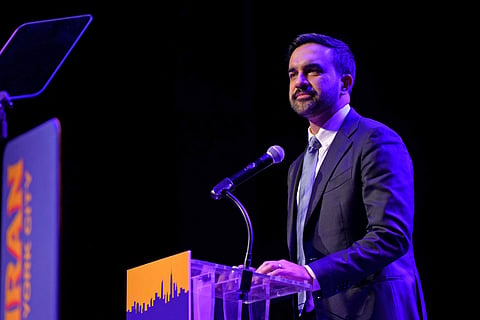Zohran Mamdani’s challenges ahead: Turning ideals into governance
Housing, safety, and strained ties with Trump top to-do list for New York’s new mayor

Zohran Mamdani’s sweeping victory in New York City’s mayoral race was a defining political moment — and a daunting inheritance. The 34-year-old democratic socialist from Queens, who built his campaign around affordability, equality, and immigrant empowerment, now faces the challenge of translating lofty ideals into workable governance in America’s largest and most complex city.
Mamdani’s rise — from a relatively obscure state legislator to the 111th mayor of New York — captured national attention for its symbolism as much as its substance. His election as the first Muslim, first South Asian, and youngest mayor in more than a century has redefined the city’s political narrative. Yet the same insurgent energy that powered his campaign may now test his capacity to govern.
Ambitious promises meet fiscal reality
Mamdani campaigned on an expansive social agenda: rent freezes for tenants in stabilised units, universal childcare, free and faster city buses, city-run grocery stores, and a new Department of Community Safety to dispatch mental health professionals instead of police for certain emergencies. But implementing those plans will require navigating a tight budget and resistance from Albany.
New York Governor Kathy Hochul has already ruled out raising taxes on high earners — a key funding plank in Mamdani’s proposal. Business leaders and real estate groups, wary of his “tax the rich” rhetoric, have warned of capital flight and investment slowdowns. Bloomberg reported that even before his swearing-in, Mamdani’s proposals have unsettled Wall Street and corporate donors.
Quick takeaways:
First Muslim and South Asian mayor of New York, and youngest in over a century
Faces pressure to deliver ambitious social reforms amid fiscal constraints
Must balance progressive ideals with state and federal opposition
Trump has threatened to cut funds, Hochul opposes higher taxes on wealthy
Early focus: housing crisis, NYPD relations, and staffing his administration
A delicate balancing act on policing and safety
Mamdani’s past calls to “defund” what he once described as a “rogue” NYPD have drawn scrutiny. Though he has since apologised and expressed willingness to retain the current commissioner, his handling of police reform will be watched closely. Maintaining credibility with both reform advocates and law enforcement will be one of his earliest tests.
Political friction with Washington
President Donald Trump has repeatedly targeted Mamdani, calling him a “communist lunatic” and threatening to withhold federal funds. In response, Mamdani has vowed that “New York will remain a city built by and for immigrants,” framing his administration as a bulwark against what he calls “a hostile White House.”
Governing the mandate
More than two million New Yorkers voted in the election — the highest turnout in over five decades — giving Mamdani a clear mandate for change. Yet expectations are immense. Even some of his supporters acknowledge that his promises may outpace fiscal or political realities.
As celebrations fade, the city’s new mayor inherits both a moment and a minefield — a chance to reshape New York’s social contract, but under the sharpest possible scrutiny from Albany to Washington.




